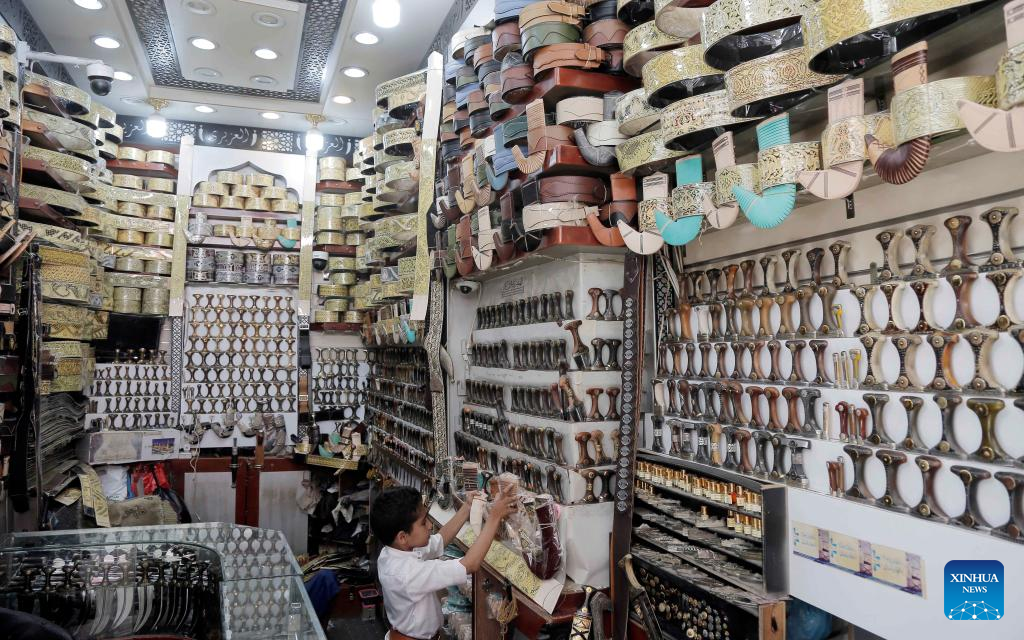
Traditional daggers are on sale at a market in Sanaa, Yemen, June 11, 2024. (Photo by Mohammed Mohammed/Xinhua)
SANAA, June 14 (Xinhua) -- As the Muslim world prepares for the joyous celebrations of Eid al-Adha, a somber mood hangs over Yemen's capital.
The country, ravaged by nearly a decade of civil war, now faces a new challenge: a crippled economy further strained by the escalating crisis in the Red Sea.
In Sanaa's Old City, the famed Al-Melh market used to be known for its labyrinthine alleys overflowing with affordable Eid delights, from colorful clothing to trays filled with sweet treats.
But this year, with one of the most important festivals for Muslims only days away, the market is quieter than a praying morning.
"It's like a ghost town," lamented Qasim Abu Arabi, a sweets vendor at Al-Melh. "Sales are down 80 percent this year. People used to come here with big plans for Eid, buying sweets for the whole family. Now, they just grab a few things."
Abu Arabi pointed to the overflowing displays of cookies and chocolates, a stark contrast to the usual pre-Eid buying frenzy. He explained that recent increases in sea shipping costs had driven up wholesale prices, forcing him to raise his own.
Arabi's experience echoes the broader economic crisis gripping Yemen. Soaring sea shipping costs have pushed up prices across the board, making even basic Eid essentials a luxury for many.
"Everything is too expensive," complained Um Khalid, a shopper browsing the market. "Eid used to be a time for families to come together and celebrate, but now it feels like a burden."
The plight of Sanaa's shopkeepers extends far beyond Al-Melh. In other stores, shelves overflow with unsold sweets and festive decorations. The festive spirit seems to have dimmed under the weight of economic hardship.
In an attempt to alleviate the financial strain, an exhibition for "productive families" was organized in the city's al-Sabeen Park. Here, families showcase and sell their homemade goods, offering a glimmer of hope and a chance to earn a living before the Eid holiday.
"I found plenty of good things here - clothes, sweets, and handicrafts," said Muhsen Aatef, a visitor to the exhibition. "It's a good way to support local families and find Eid items at lower prices."
However, such initiatives can only offer a small measure of relief. The roots of Yemen's economic woes run deep. The United Nations paints a grim picture: a decade of war has pushed millions into poverty. Over 1.2 million civil servants haven't received salaries in eight years, and hundreds of thousands have lost their jobs.
"Four out of five Yemenis face poverty, and half the population - over 18 million people - desperately need humanitarian aid," according to a recent report by the Norwegian Refugee Council.
"Eid should be as sweet as the confectionaries I sell," said Abu Arabi wistfully in his empty store. "But I guess there's no candy in the world that can sweeten life here right now." ■



